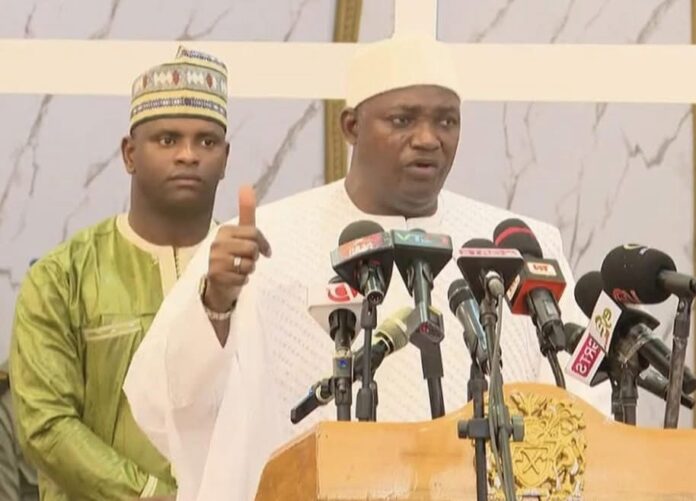By Alf Soninke
I listened to President Adama Barrow and his minister for religious affairs, Hamat Bah. This was on Sunday, during the traditional meeting of Muslim religious leaders with the President at State House, after performing the Eid ul Fitr prayer in Banjul.
Their statements evoked many thoughts and questions in me. One of them is whether the President has the authority to provide a fixed monthly salary to the Imam Ratib of Banjul, as announced by Hamat Bah.
The minister also said the same gesture was extended to the Gambia Christian Council, GCC.
Under what mechanism is this payment to two personalities of Gambian Muslims and Christians being made?
Indeed, in a “secular” republic and supposedly democratic state, can the President make such payments, presumably from the Consolidated Fund or public purse, without going through the National Assembly, that is, seeking first and receiving parliamentary approval as custodians of the national budget?
Or is it the case that State House has extra funds allocated – a caisse noire, like they have in Senegal and elsewhere from secret funds provided – in the 2025 budget allocation for the Executive, into which the President can dip his hand whenever he wants to make payments he deems fits or based on his whims and caprices?
Also, who is the Christian equivalent or opposite number of the Imam Ratib of Banjul at the GCC? The current post holder of Chairman of the GCC is the Most Rev. Barnie Manga, superintendent of the Methodist Mission. I believe the current chairman of the Gambia Supreme Islamic Council (GSIC), Alhaji Essa Darboe, is Manga’s counterpart.
So who will be recipient of the salary earmarked for the GCC in line with providing a salary to the Imam Ratib?
Moreover, during the meeting, it was revealed that the Gambia Supreme Islamic Council wants to establish a Waqf system in the Gambia.I have always felt that Muslims in the Gambia need to compensate our imams and others for their services to the community.
For example, Muslims attending the weekly congregational Friday prayer should voluntarily give from their pocket or purse (women) at least D10 to D25 – and more, of course, by whoever can afford to give more – to the mosque’s weekly cash collection.
This money could be gathered in a fund from which the imam and his assistants are given a fixed monthly income and from which they can pay for cashpower, NAWEC water supply charges, the mosque cleaners, and watchmen.
Also, to provide other aid to the identifiable needy/vulnerable in the community, such as the many “beggars” who come to the mosque for alms.
I believe that establishing a Waqf for the benefit of Muslims, well-managed by the Companions of the Prophet and successor Khalifas such as Umar, is the way forward in addressing the income/survival needs of the imams and their assistants and complementing what they received from Zakat.
I think a government or state payment for our religious leaders is problematic and could compromise their freedom of conscience, expression, etc.
The fact that it is unprecedented in the Gambia and just being started—which President Barrow and his minister are claiming—should also make Gambians wonder if it’s not another one of our politicians’ usual self-serving policies.






